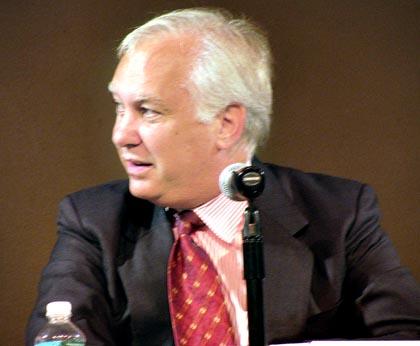By Philip Newman
For his part, former city Parks Commissioner Henry Stern wanted it known he did not like tolls on bridges and tunnels and thought there was too much car bashing.
“I don’t favor making an enemy of cars like we have done with cigarettes,” said Stern, moderator of “The Future of the MTA,” a transportation forum at the Museum of the City of New York July 15.
“I have some experience with mass transit. I started riding the subway when it cost a nickel,” said Stern, 74, a Manhattan native who graduated from the Bronx High School of Science at 15.
Another panelist, City Councilwoman Gail Brewer (D-Manhattan), said the big transit problem in her Upper West Side district was buses. She said buses serving her district had made the Straphanger Campaign’s Pokey Awards several times. She said more than 250 of her constituents showed up at the last bus meeting.
State Assemblyman Richard Brodsky (D-Elmsford) sat to the left of Nicole Gelinas, a Searle Freedom Trust fellow at the Manhattan Institute. They were not that close in their ideas about how to improve mass transit.
Gelinas said the ultimate goal was to provide a rapid transit system on which people could travel from midtown Manhattan to the farthest point of the metropolitan area in 30 minutes.
She said there were financial problems and high labor costs in the Metropolitan Transportation Authority were a big one.
That was the point Gelinas and Brodsky began differing on.
Gelinas said the average pay of MTA subway track workers was $59,000 before overtime or benefits.
She said the MTA pays $54,000 to station booth agents, who “can retire at 55 with benefits,” but that the work should go to part-time workers such as college students, and for less pay.
Gelinas said it might take confronting the unions to make changes she said were essential.
Brodsky took exception to some of her comments, suggesting they approached “labor-bashing.”
Brodsky said the MTA’s future might well be shaped by recent Albany legislation that makes the newly established chairman-CEO-executive director fiduciarily responsible for the MTA above all people or entities.
“It should be interesting,” Brodsky said. “Let’s see what happens next time some mayor calls for a subway line to nowhere.”
Paul Steely White of Transportation Alternatives, which advocates more use of bicycles, walking and, in fact, most anything rather than automobiles, was the fourth panelist.
White called for more state, city and federal money for mass transit, then mentioned he belonged to an advocacy agency that says the people living where mass transit is available are healthier than areas limited to motor vehicles.
Reach contributing writer Philip Newman by e-mail at timesledgernews@cnglocal.com or phone at 718-229-0300, Ext. 136.

































